 W
WThe DuMont Television Network was one of America's pioneer commercial television networks, rivalling NBC and CBS for the distinction of being first overall in the United States. It was owned by Allen B. DuMont Laboratories, a television equipment and set manufacturer, and began operation on June 28, 1942.
The DuMont Television Network was launched in 1946 and ceased broadcasting in 1956. Allen DuMont, who created the network, preserved most of what it produced in kinescope format. By 1958, however, much of the library had been destroyed to recover the silver content of the film prints. Most of whatever survived was later loaded onto three trucks and dumped into Upper New York Bay in the mid-1970s. Since then, there has been extensive research on which DuMont programs have episodes extant.
 W
WA for Andromeda is a British television science fiction drama serial first made and broadcast by the BBC in seven parts in 1961. Written by cosmologist Fred Hoyle, in conjunction with author and television producer John Elliot, it concerns a group of scientists who detect a radio signal from another galaxy that contains instructions for the design of an advanced computer. When the computer is built, it gives the scientists instructions for the creation of a living organism named Andromeda, but one of the scientists, John Fleming, fears that Andromeda's purpose is to subjugate humanity.
 W
WThe Alan Dale Show is an early American television program which ran on the DuMont Television Network in 1948, and then on CBS Television from 1950-1951.
 W
WThe Big Surprise is a television quiz show broadcast in the United States by NBC from October 8, 1955, to June 9, 1956, and from September 18, 1956, to April 2, 1957. It was hastily created by NBC in response to the ratings success of The $64,000 Question, which had premiered on CBS in summer 1955 and almost instantly became a hit. The Big Surprise offered a grand prize of $100,000.
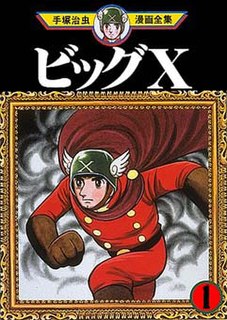 W
WBig X is a science fiction manga series and an anime series by Osamu Tezuka, based on actual experiments conducted by the Nazis to create secret weapons toward the end of World War II. Out of the 59 anime episodes, only episodes 1, 11, and 40-59 are known to survive, the others remain missing.
 W
WBoyd Q.C. is a British legal television programme transmitted from December 1956 to 1964 by the ITV franchise holder Associated-Rediffusion. It focused around a barrister in a London courtroom and the cases in which he was involved. It ran for seven series in total.
 W
WBuck Rogers is a science fiction character created by Philip Francis Nowlan in the novella Armageddon 2419 A.D., subsequently appearing in multiple media. First published in the August 1928 issue of the pulp magazine Amazing Stories, the character and story were shortly adapted into a syndicated comic strip which debuted in early 1929. Later adaptations included radio in 1932, a serial film, a television series, and other formats.
 W
WDoraemon is the first anime TV series based on Fujiko F. Fujio's manga of the same name. It was produced by Nippon TeleMovie Productions. It aired from April 1, 1973 to September 30, 1973. After the anime ended, Doraemon remained exclusively a manga until 1979 when Shin-Ei Animation produced a more successful second anime adaptation, which officially ended in 2005; it was in turn replaced by a third anime adaptation shortly after which continues to air to recent days. The series is now considered as a piece of lost media due to its rarity and many episodes were lost to fire. Of the 52 segments, only 21 are known to survive.
 W
WDream House was an American game show that saw contestants competing to win, as the title of the show indicates, a new house. The show originally premiered in primetime on ABC on March 27, 1968, with a daytime edition premiering on April 1, 1968. The primetime series aired weekly until September 19, 1968 and the daytime series aired daily until January 2, 1970, when it was replaced with All My Children. The daytime series was revived for NBC's daytime schedule and premiered on April 4, 1983, running until June 29, 1984.
 W
WThe Eurovision Song Contest 1964 was the 9th edition of the Eurovision Song Contest. It took place in Copenhagen, Denmark, following the country's victory at the 1963 contest with the song "Dansevise" by Grethe & Jørgen Ingmann. It was the first time the contest took place in Denmark - also marking the first time a Nordic country hosted the event. The contest was held at Tivolis Koncertsal on Saturday 21 March 1964, and was hosted by Lotte Wæver.
 W
WExhibition Boxing Bouts is the possible title for a very early American television series. Aired 1931 to 1932 in New York City, it consisted of miniature boxing matches, and aired on what was then mechanical television station W2XAB, which later became WCBS-TV. Time-slots varied from 15 minutes to 30 minutes, and it aired without commercials, as United States television was still an experimental service. According to the section "Radio Dial Log" in the August 20, 1931 edition of The New York Sun, one of the episodes featured a description by Harry Von Zell and Bill Schudt Jr, with Jimmie deForrest as the referee. None of the episodes still exist, as it aired live, and practical methods to record live television did not exist until late 1947. A still photograph of the series appears in page 19 of the February 20, 1932 edition of The New York Sun, depicting two boxers in a small ring.
 W
WEye Guess was an American game show created by Bob Stewart and hosted by Bill Cullen, which aired on NBC from January 3, 1966, to September 26, 1969. The game combined a general knowledge quiz with a Concentration-style memory element, where the answers were shown to the players and their recall of their positions was tested.
 W
WFaraway Hill was the first soap opera broadcast on an American television network, airing on the DuMont Television Network on Wednesday nights at 9:00 PM between October 2 and December 18, 1946.
 W
WFuture Shock is a television variety show produced and hosted by James Brown from 1976 to 1979. Shot in Augusta and Atlanta, Georgia and broadcast late on Friday nights on the Ted Turner-owned UHF station WTCG, it featured local amateurs performing a variety of popular and emerging dance styles, including disco, locking and popping, and early breakdancing, to prerecorded music. Brown and his musical guests also performed briefly. Other regular features included dance contests, interviews, and segments on African-American history. "Future Shock ", a song written by Brown and recorded by Maceo Parker with The J.B.'s, served as the show's nominal theme music, though it was not consistently used.
 W
WGarfield Goose and Friends is a children's television show produced by WGN-TV in Chicago, Illinois, United States from 1955 to 1976. The show was known as Garfield Goose and Friend from 1952 to 1955 when it aired on WBKB and WBBM-TV. It was the longest running puppet show on television until Sesame Street broke that record. The host of the show was Frazier Thomas, who did all of the talking. The show centered on a clacking goose puppet named Garfield Goose, who considered himself "King of the United States." There were many other puppet characters such as Romberg Rabbit, Macintosh Mouse, Chris Goose and a sleepy bloodhound called Beauregard Burnside III. The show used a "Little Theater Screen", upon which the camera would zoom before cartoons such as Total Television, The Funny Company, Clutch Cargo, The Pink Panther, Jay Ward, Hanna-Barbera, Space Angel and The Mighty Hercules were broadcast.
 W
WGarnock Way was a short-lived Scottish soap opera, produced by Scottish Television for the ITV network, running from 1976 to 1979. It was replaced by Take the High Road which also featured actors Eileen McCallum, Bill Henderson, Paul Kermack, Michael Elder and John Stahl.
 W
WHarriet Lee was an American radio singer during the Golden Age of Radio in the 1920s–1930s. She was best-known as a blues contralto on the Columbia Broadcasting System (CBS) and, later, NBC Radio Networks. Called the "Songbird of the Air", she was named Miss Radio 1931 based on nationwide submittals from radio stations, judged by Flo Ziegfeld and McClelland Barclay, to select the "most beautiful radio artist" for the Radio World's Fair in New York City. Lee was one of the highest paid radio stars that year. She hosted the Harriet Lee show on experimental New York City station W2XAB in 1931, making her one of the first singers to have a show on U.S. television.
 W
WThe Hazel Scott Show was an early American television program broadcast on the now defunct DuMont Television Network. The series, hosted by Hazel Scott, ran during the summer of 1950, and is most notable for being one of the first U.S. network television series to be hosted by any person of African descent.
 W
WThe Ilona Massey Show is a DuMont Television Network variety show hosted by actress Ilona Massey and featuring musician Irving Fields. Massey sang on a set built to resemble a nightclub. The show aired Mondays from November 1, 1954, to January 3, 1955 for a total of 10 episodes.
 W
WIt's Anybody's Guess is an American game show broadcast on NBC from June 13 to September 30, 1977. Monty Hall hosted the show while Jay Stewart was the announcer. Produced by Stefan Hatos-Monty Hall Productions, it was Hall's first time hosting a show other than Let's Make a Deal since 1962, when he hosted Video Village.
 W
WKinescope, shortened to kine, also known as telerecording in Britain, is a recording of a television program on motion picture film, directly through a lens focused on the screen of a video monitor. The process was pioneered during the 1940s for the preservation, re-broadcasting and sale of television programmes before the introduction of videotape, which from 1956 eventually superseded the use of kinescopes for all of these purposes. Kinescopes were the only practical way to preserve live television broadcasts prior to videotape.
 W
WThe Magnificent Marble Machine was an American television game show that featured a giant pinball machine as its centerpiece. The program premiered on NBC on July 7, 1975 at 12:00 pm ET, replacing the short-lived game show Blank Check.
 W
WMasquerade Party is an American television game show. During its original run from 1952 to 1960, the show appeared at various times on every television network except DuMont. A syndicated revival was produced for one season in 1974-75.
 W
WMissing Links is a Goodson-Todman game show hosted by Ed McMahon which originally ran on NBC from September 9, 1963 to March 27, 1964, then moved to ABC for its final nine months, with Dick Clark replacing McMahon as host.
 W
WNickel Flicks is an American television series that premiered on Nickelodeon in 1979 as one of the network's inaugural programs, and the first original series created for the channel after its launch. It showcased "cliffhanger" serials from the 1920s–40s, in addition to early comic one-reelers and silent short films. It was hosted by producer John Moschitta, who later became famous as the "World's Fastest Talker" in commercials for FedEx. This was Moschitta's first on-camera television role. Nickel Flicks was notably the first Nickelodeon show to be cancelled and the shortest-lived out of Nickelodeon's inaugural series; according to Moschitta, it was cancelled due to complaints about the violent nature of many of the serials.
 W
WNo Hiding Place is a British television series that was produced at Wembley Studios by Associated-Rediffusion for the ITV network between 16 September 1959 and 22 June 1967.
 W
WOkay, Mother is an American daytime variety/game show which originally aired on WABD in New York City in 1948.
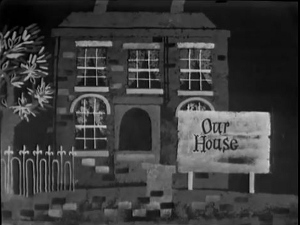 W
WOur House is a British sitcom that aired on ITV from 1960 to 1962. The main writer of the programme, which starred many actors known for their roles in the Carry On films, was Norman Hudis, who wrote the first six Carry On films from 1958 to 1962. Our House is based on the premise of nine people of differing backgrounds sharing a house together.
 W
WThe Quatermass Experiment is a British science fiction serial broadcast by BBC Television during the summer of 1953 and re-staged by BBC Four in 2005. Set in the near future against the background of a British space programme, it tells the story of the first manned flight into space, supervised by Professor Bernard Quatermass of the British Experimental Rocket Group.
 W
WSammy is an American animated television series that aired on NBC in the summer of 2000. Created by comedians David Spade and Drake Sather, the series only had a two-week run, from August 8th until August 15, 2000, with the first two episodes each being aired once. The show was said to be based loosely off Spade's early years as an actor.
 W
WShadow Squad is a British TV series that ran from 1957-59 starring Peter Williams and George Moon. 179 episodes were made, of which only four survive. Network released the surviving episodes on DVD in 2011, along with the sole surviving episode of the spin-off, Skyport. Both series were produced by Granada Television.
 W
WShowoffs is an American television game show which ran on ABC from June 30 to December 26, 1975. Bobby Van was host, with Gene Wood as announcer. The Mark Goodson-Bill Todman production involved two teams competing in a game of charades.
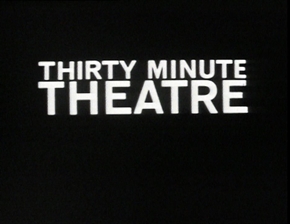 W
WThirty-Minute Theatre was an anthology drama series of short plays shown on BBC Television between 1965 and 1973, which was used in part at least as a training ground for new writers, on account of its short running length, and which therefore attracted many writers who later became well known. It was initially produced by Graeme MacDonald.
 W
WVideo Hits was a Canadian music video program broadcast nationally on CBC Television from 1984 to 1993. Created by producer Sandra Faire, Video Hits aired weekday afternoons, and featured promotional music videos of the day's top hit songs from Canadian and international artists, along with artist interviews. The show's original host was Samantha Taylor. A similar music video show, Good Rockin' Tonite, also aired on CBC Television on Friday nights concurrently with Video Hits.
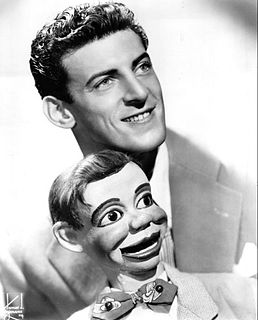 W
WPaul Winchell was an American ventriloquist, comedian, actor, humanitarian, and inventor, whose career flourished in the 1950s and 1960s. From 1950 to 1954, he hosted The Paul Winchell Show, which also used two other titles during its prime time run on NBC: The Speidel Show, and What's My Name? From 1965–1968, Winchell hosted the children's television series Winchell-Mahoney Time.
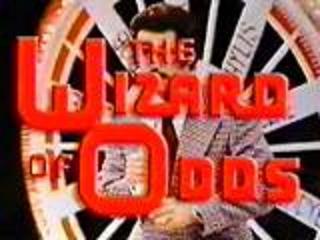 W
WThe Wizard of Odds is an American television game show hosted by Alex Trebek that aired on NBC from July 16, 1973, to June 28, 1974, in which people from the studio audience vied in a number of rounds, primarily games revolving around statistical questions. John Harlan announced the pilot; Los Angeles radio personality Sam Riddle was the show's first announcer; towards the end of the run, Charlie O'Donnell replaced him.
 W
WThe Worker is a British sitcom that aired on ITV from 1965 to 1978. Co-written by and starring comedian Charlie Drake, the programme revolved around a man who has been dismissed from nearly 1,000 jobs.